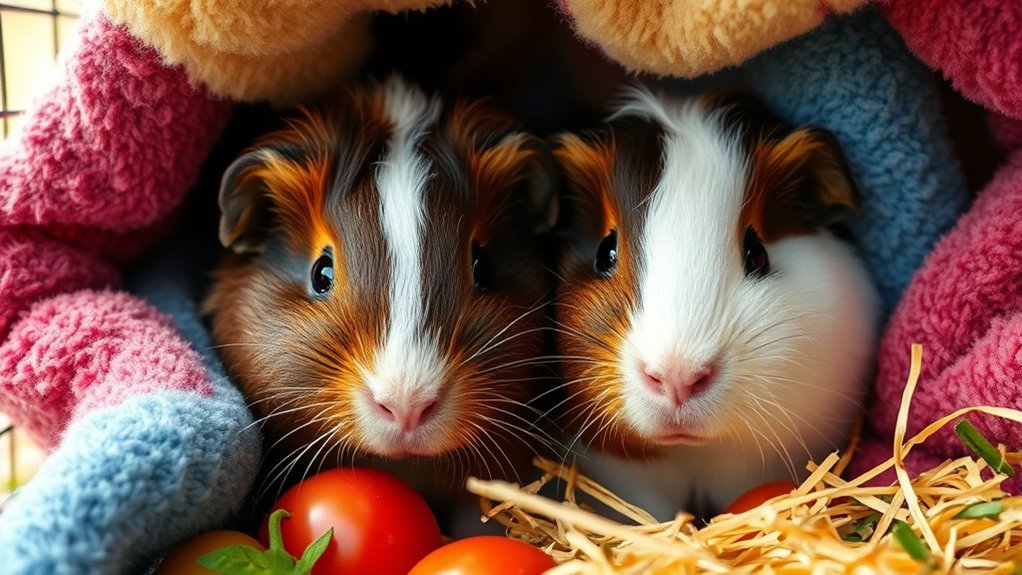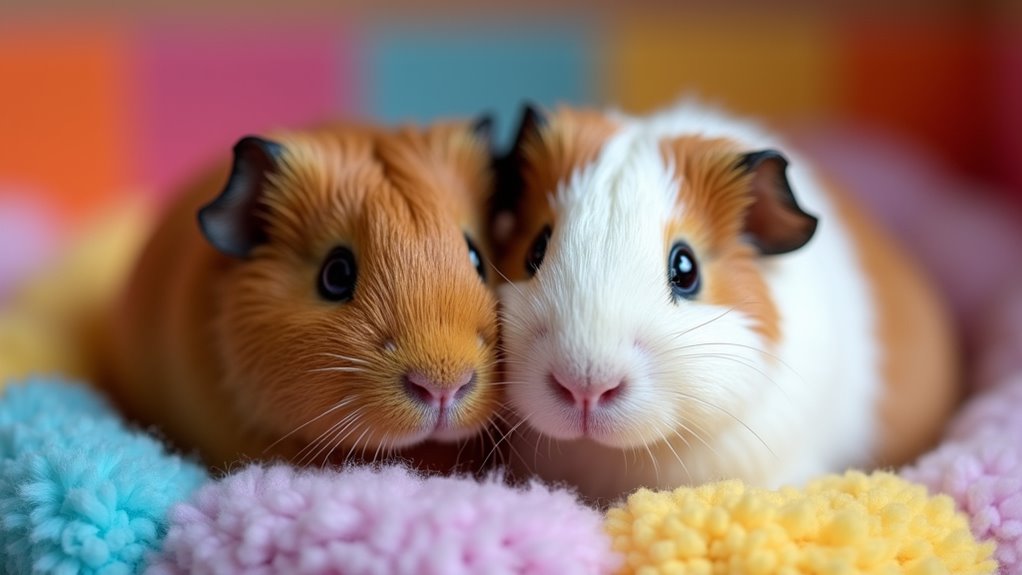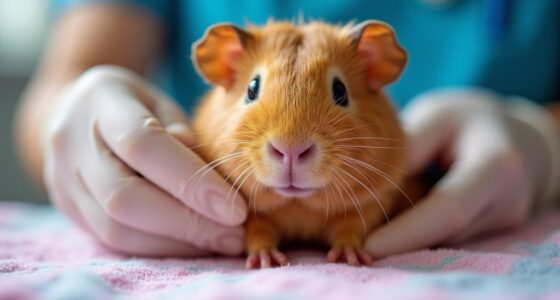Yes, guinea pigs can definitely get lonely if kept alone since they are naturally social animals that thrive on companionship and interaction. Without a partner or group, they may become bored, withdrawn, or show signs of stress and loneliness. Proper social environments with compatible cage mates help keep them happy, active, and healthy. Understanding their social needs is essential—stay with us to discover more ways to guarantee your guinea pig’s happiness and well-being.
Key Takeaways
- Guinea pigs are social animals that thrive on companionship and interaction.
- Keeping a guinea pig alone can lead to loneliness, boredom, and reduced activity.
- Providing a compatible companion helps prevent loneliness and promotes natural social behaviors.
- Signs of loneliness include withdrawal, inactivity, and lack of social engagement.
- A proper social environment with companionship and enrichment is essential for their well-being.

Guinea pigs are social animals that thrive on interaction and companionship. If you’ve ever wondered whether your guinea pig gets lonely, understanding their natural behaviors can help. These creatures are naturally inclined toward group behavior, meaning they prefer living with others rather than alone. When kept in pairs or small groups, they tend to be more active, happier, and less stressed. Group behavior isn’t just a preference; it’s a crucial part of their well-being. They often groom each other, cuddle, and communicate through a variety of sounds, all of which help strengthen their bonds. If you only have one guinea pig, it’s important to recognize that they might be missing out on these social interactions, which can lead to signs of loneliness or boredom.
While guinea pigs are inherently social, they also display solitary tendencies if not given the right environment or companions. Sometimes, if kept alone for too long or in an inadequate space, they might show signs of withdrawal, such as reduced activity or a lack of interest in their surroundings. This isn’t necessarily because they prefer solitude but often because they’re missing the social stimulation they crave. They may become lethargic or even develop health issues if their loneliness persists. That’s why many experts recommend keeping them in pairs or small groups, as long as the animals are compatible and introduced properly. When you provide a social setting, you’re helping prevent these solitary tendencies from taking hold and making your guinea pig feel isolated.
Understanding their social needs also involves observing their interactions. If your guinea pigs are constantly grooming each other, sitting close, or communicating through soft squeaks and chirps, it’s a good sign they’re content and engaged. Conversely, if they’re ignoring each other or showing signs of aggression, you might need to re-evaluate their groupings or environment. Keep in mind that introducing new guinea pigs should be done carefully to ensure compatibility and prevent conflicts. Providing a spacious, enriched habitat allows them to engage in natural behaviors and reduces the likelihood of loneliness or territorial disputes.
In essence, your guinea pig’s happiness hinges on their social environment. Recognizing their group behavior tendencies and discouraging solitary tendencies by offering companionship, proper space, and stimulation will help keep your furry friend healthy and happy. Ignoring their social needs can lead to loneliness, which isn’t just emotionally taxing for them but can also impact their physical health. So, make sure you’re paying attention to their interactions, and give them the social life they’re naturally inclined to enjoy.
Frequently Asked Questions
Can Guinea Pigs Bond With Other Species Besides Their Own?
You might wonder if guinea pigs can bond with other species besides their own. While they thrive with other guinea pigs, some owners explore cross species companionship, like small birds or rabbits. However, exotic pet interactions can be unpredictable, and not all animals get along well. Always supervise these introductions carefully, ensuring safety and comfort for everyone involved. Remember, guinea pigs are social, but their best bonds are usually with their own kind.
How Do I Introduce a New Guinea Pig to My Existing One?
Did you know that guinea pigs are 80% more likely to bond successfully when introduced properly? To introduce a new guinea pig, use bonding techniques like swapping bedding first to familiarize them with each other’s scent. Keep them in a neutral territory during initial meetings and make sure your cage setup has plenty of hiding spots. Gradually increase time together to build a positive relationship, guaranteeing both feel safe and comfortable.
What Are Signs of Loneliness in a Guinea Pig?
You’ll notice signs of loneliness in your guinea pig through changes in bonding behaviors and social cues. They might become less active, show reduced grooming, or vocalize more often for companionship. If they seem withdrawn or less interested in play, it’s a sign they crave social interaction. Paying attention to these cues helps you guarantee your guinea pig gets the companionship they need to stay happy and healthy.
Do Male and Female Guinea Pigs Get Along Better?
They say “Birds of a feather flock together,” and the same applies to guinea pigs. Male and female guinea pigs often get along well if properly introduced, but gender compatibility depends on individual personalities and socialization. Consider breeding considerations and avoid pairing two unneutered males or females to prevent conflicts. Always monitor their interactions, and providing companionship helps keep your guinea pigs happy and healthy.
How Much Social Interaction Do Guinea Pigs Need Daily?
Guinea pigs thrive with at least 1-2 hours of daily social interaction, including gentle handling and playtime. To support this, make sure their cage size is spacious enough to include enrichment activities like tunnels and toys, which keep them stimulated. Regular interaction helps prevent loneliness and promotes their well-being. Remember, the more engaged and active they are, the happier and healthier they’ll be.
Conclusion
So, do guinea pigs get lonely? The truth is, they absolutely thrive with companionship. Many believe they’re solitary animals, but studies show they’re happiest when they have a buddy to share their day. If you want a healthy, happy guinea pig, don’t leave them alone for too long—pair them up and watch them flourish. After all, a social life isn’t just a luxury; it’s essential for their well-being.









